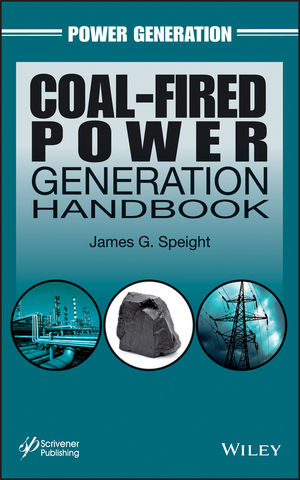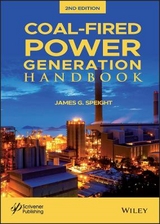
Coal-Fired Power Generation Handbook
Wiley-Scrivener (Verlag)
978-1-118-20846-5 (ISBN)
- Titel erscheint in neuer Auflage
- Artikel merken
The most complete and up-to-date handbook on power generation from coal, this book covers all of today's new, cleaner methods for creating electricity from coal, the environmental challenges and concerns involved in its production, and developing technologies
Coal accounts for approximately one quarter of world energy consumption. Of the coal produced worldwide, approximately 65% is shipped to electricity producers and 33% to industrial consumers, and most of the remainder goes to consumers in the residential and commercial sectors. The total share of total world energy consumption by coal is expected to increase to almost 30% in 2035.
This handbook describes the challenges and steps by which electricity is produced from coal and deals with the challenges for removing the environmental objections to the use of coal in future power plants. New technologies are described that could virtually eliminate the sulfur, nitrogen, and mercury pollutants that are released when coal is burned for electricity generation. In addition, technologies for the capture of greenhouse gases emitted from coal-fired power plants are described and the means of preventing such emissions from contributing to global warming concerns.
James G. Speight is a senior fuel consultant and Visiting Professor at the University of Trinidad and Tobago and Adjunct Professor of Chemical and Fuels Engineering at the University of Utah, USA. He is recognized internationally as an expert in the characterization, properties, and processing of conventional and synthetic fuels and has more than 40 years of experience in the process industries. He is the author of numerous books and papers and the editor on the Journal of Sustainable Energy Engineering, and he has won numerous awards and distinctions.
Preface xv 1 Occurrence and Resources 1
1.1 Introduction 1
1.2 Origin of Coal 8
1.3 Occurrence 12
1.4 Coal Utilization and Coal Types 14
1.5 Resources 23
1.6 Reserves 27
References 34
2 Classification 37
2.1 Introduction 37
2.2 Classification Systems 40
2.3 Coal Petrography 58
2.4 Correlation of the Various Systems 63
References 67
3 Recovery, Preparation, and Transportation 69
3.1 Introduction 69
3.2 Coal Recovery 71
3.3 Coal Preparation 79
3.4 Size Reduction 92
3.5 Coal Cleaning 98
3.6 Coal Drying 106
3.7 Desulfurization 113
3.8 Transportation 115
References 121
4 Storage 127
4.1 Introduction 127
4.2 Oxidation and Spontaneous Ignition 129
4.3 Mechanism of Spontaneous Ignition 140
4.4 Stockpiling 144
4.5 Effect of Storage 149
4.6 Preventing Spontaneous Ignition 151
References 153
5 General Properties 159
5.1 Introduction 159
5.2 Sampling 164
5.3 Proximate Analysis 171
5.4 Ultimate Analysis 187
5.5 Calorific Value 195
5.6 Reporting Coal Analyses 198
References 204
6 Physical, Mechanical, and Thermal Properties 211
6.1 Introduction 211
6.2 Physical Properties 215
6.3 Mechanical Properties 225
6.4 Thermal Properties 234
6.5 Epilogue 245
References 245
7 Combustion 251
7.1 Introduction 251
7.2 General Aspects 255
7.3 Chemistry and Physics 258
7.4 Catalytic Combustion 279
7.5 Fuels 280
References 307
8 Combustion Systems 315
8.1 Introduction 315
8.2 Combustion Systems 319
8.3 Fuel Feeders 352
References 353
9 Gasification 355
9.1 Introduction 355
9.2 General Aspects 358
9.3 Chemistry and Physics 364
9.4 Catalytic Gasification 371
9.5 Plasma Gasification 373
9.6 Gasification Systems 374
9.7 Gaseous Products 383
9.8 Gasification of Coal with Biomass and Waste 390
9.9 Underground Gasification 397
References 401
10 Gasification Systems 407
10.1 Introduction 407
10.2 Fixed-Bed Processes 409
10.3 Fluidized-Bed Processes 416
10.4 Entrained-Bed Processes 429
10.5 Molten Salt Processes 434
10.6 Underground Gasification 437
References 442
11 Electric Power Generation 445
11.1 Introduction 445
11.2 Electricity From Coal 448
11.3 Steam Generation 452
11.4 Control of Emissions 461
References 474
12 Gas Cleaning 477
12.1 Introdution 477
12.2 Environmental Legislation 482
12.3 General Aspects 485
12.4 Air Pollution Control Devices 490
12.5 Particulate Matter Removal 493
12.6 Acid Gas Removal 505
12.7 Removal of Sulfur-Containing Gases 511
12.8 Removal of Nitrogen-Containing Gases 515
References 517
13 Environmental Aspects of Power Generation 521
13.1 Introduction 521
13.2 Coal Preparation 525
13.3 Transportation and Storage 529
13.4 Combustion 532
13.5 Gasification 540
13.6 Power Plant Waste 547
13.7 The Future 571
References 575
14 Clean Coal Technologies for Power Generation 579
14.1 Introduction 579
14.2 Historical Perspectives 588
14.3 Modern Perspectives 590
14.4 Clean Coal Technology 593
14.5 Managing Wastes from Coal Use 624
14.6 Carbon Dioxide Capture and Sequestration 626
References 637
15 Coal and Energy Security 645
15.1 Introduction 645
15.2 Energy Security 649
15.3 National Energy Plan and Coal Utilization 656
15.4 Electric Power Generation 659
15.5 Hydrogen from Coal 661
15.6 Energy Security and Sustainable Development 664
References 673
Glossary 675
Common Conversion Factors Used in Coal Technology 723
Index 727
| Reihe/Serie | Power Generation |
|---|---|
| Sprache | englisch |
| Maße | 158 x 239 mm |
| Gewicht | 1179 g |
| Themenwelt | Technik ► Elektrotechnik / Energietechnik |
| ISBN-10 | 1-118-20846-3 / 1118208463 |
| ISBN-13 | 978-1-118-20846-5 / 9781118208465 |
| Zustand | Neuware |
| Informationen gemäß Produktsicherheitsverordnung (GPSR) | |
| Haben Sie eine Frage zum Produkt? |
aus dem Bereich



